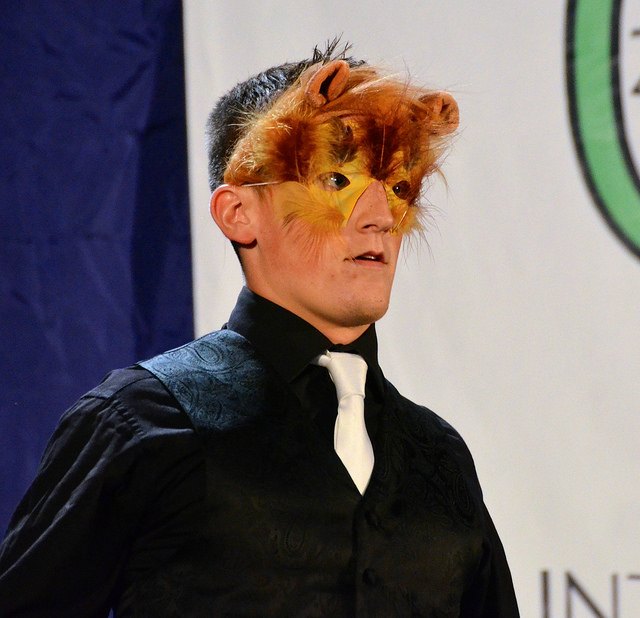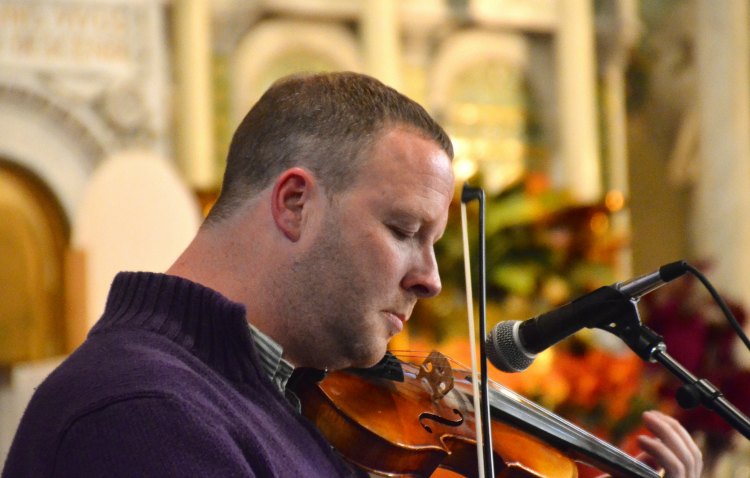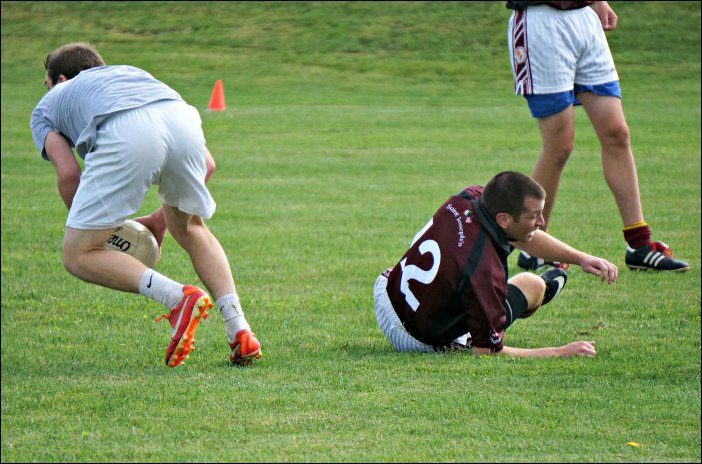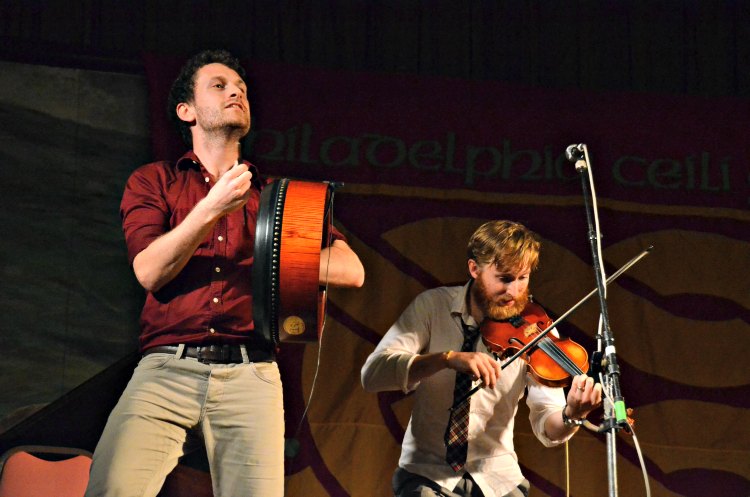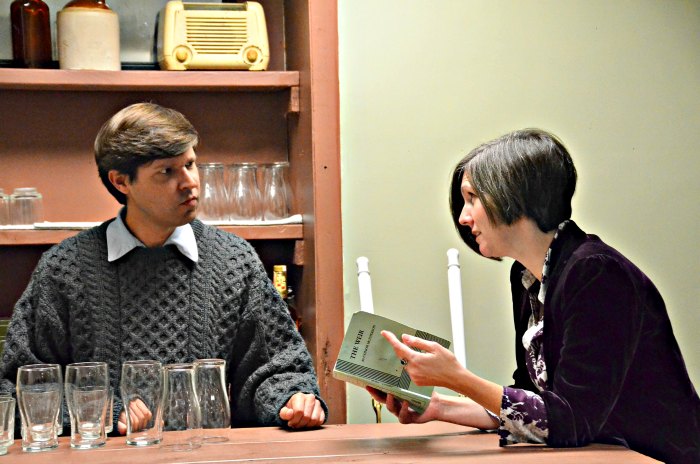
Bridget Reilly Beauchamp goes over lines with Jim Broyles.
You could say “The Weir” is about ghost stories.
You could say it’s about faeries, and the forts where they hid.
You could say, as playwright Conor McPherson once described it, that “just people talking.”
“The Weir,” opening Friday, October 17, in a bright, cozy little performance space on the second floor of a commercial building at 305 Old York Road in Jenkintown, is much more than that, says Bridget Reilly Beauchamp, founding director of Pulley & Buttonhole Theatre Company.
Beauchamp, who read the play and fell in love with it, says she has trouble explaining it because, on the surface, it might not seem like much more is going on than a gathering of people—as McPherson would have it, just talking.
Presiding over a rehearsal one night last week, Beauchamp explained as best she could. “Weirs are dams that don’t restrict water. The currents downstream from the weir can be deep, and they can pull you down. This play is about what you do when you go over the dam and hit the currents. At the end of it, there’s such hope. It’s like a new family has been found. There’s a sense that they have broken free of the currents.”
In “The Weir,” four men gather one night in a sleepy pub in Ireland’s dark countryside, and they’re joined by Valerie, a far more worldly-wise young woman from Dublin. And, yes, the evening begins with some creepy ghost stories, but the conversation turns darker as the young woman shares her own harrowing tale.
A review in London’s Guardian summed it all up pretty well:
“When the stories are spun from the men’s lives, they have a competitive edge—but Valerie has a story that can top them all. As Jack (Brian Cox), the grumpy, melancholic garage owner, proves in the dying embers of the evening, we are all haunted by different kinds of ghosts.”
Ultimately, “The Weir” is a story about the sadness and isolation of the men’s’ lives out in the back of beyond, but there’s a hint of redemption at story’s end.
Beauchamp, who grew up in Jenkintown, understands the closeness—sometimes too close—of small-town life, and it gives her an even deeper appreciation for the play. “Every ‘hello’ here has 40 years of life behind it.”
Her Irish background—her mother a Costello, her father a Reilly, and a birthday two days before St. Patrick’s Day, with its legacy of green birthday cakes—also plays a small part in her understanding of “The Weir,” even though she has never been to Ireland. “There is an ‘Irishness’ to it. You have faeries, of course. There is that sadness, but there is also perseverance.”
“The Weir” opens the season for this tiny company, which draws in a fair number of people who have never acted before. Its name, Beauchamp, comes from a line in a poem by Naoli Shihab Nye, “Famous.” This is the verse:
“I want to be famous in the way a pulley is famous, or a buttonhole, not because it did anything spectacular, but because it never forgot what it could do.”
Beauchamp fell in love with acting and the theatre while she was in high school, as she sat on a stage and watched people dancing around her. She went on to earn degrees in theatre and French from the Allentown College of St. Francis de Sales. “I always knew that’s what I’m supposed to be, and what I’m supposed to do.” She now makes her living as a theatrical dresser, and, although she describes her job as “fun and interesting,” something was missing. That’s when she and friend Kate Pettit co-founded Pulley & Buttonhole.
Working with local people, only a few of whom have acting background, is for Beauchamp a fulfilling part of the process.
Watching the rehearsal, you can tell that her actors feel the same excitement—and they’re quite good, and very convincing in their roles as the take up seats around a bar, replete with Guinness bottles—the fact that the taps are down is a source of some consternation for one of the characters—and bottles of Irish whiskey. (Not real, says Beauchamp.) They’re accents are not quite always spot-on, but for people with no experience on the stage, they come a lot closer to the real deal than many actors with more experience.
One of the cast members, Mark Schule, spent some time in County Sligo, and he developed a good sense for the rhythms and inflections of native Irish, and he shared what he knew with his fellow actors. Beauchamp kept them practicing, and she even told them to do something a little chancy. “Go hang out with people who don’t know who you are, use your accent, and see if they fall for it.”
The experiment apparently worked. The result is some fairly convincing, almost musical, but in no way over-the-top Barry Fitzgerald hammery. “I told them: We’re not doing Lucky Charms here.”
The Pulley & Buttonhole Theatre will hold about 60 audience members. You can be one of them. The play runs October 17, 18, 24 & 25. There’s no elevator access to the theatre space.
Learn more here:
http://www.pulleyandbuttonholetheatre.org/the-weir.html
Here are a few photos from rehearsal.
[flickr_set id=”72157648208925329″]

